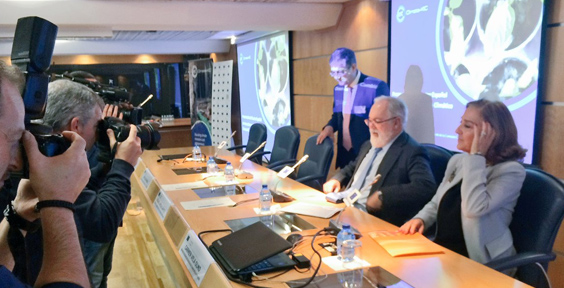Climate-KIC goes national in Spain, EU climate commissioner joins presentation in Madrid

In Spain, Climate-KIC is expanding from a regional level in Valencia to a national presence across the country. Last week (21 October), the EU’s climate action and energy Commissioner, Miguel Arias Cañete, joined a range of guests for a presentation of the Climate-KIC activities across Spain.
The meeting in Madrid included a selection of climate-committed public and private stakeholders from across the innovation ecosystem in Spain at the representation of the European Commission in Spain.
José Luis Muñoz, director for Climate-KIC in Spain, stressed the organisation’s main mission is 'to encourage new business opportunities and create new jobs to tackle this big local and global climate change challenge.'
Climate-KIC, with a regional headquarters in Valencia, has started operating across Spain since January 2016. Commissioner Cañete emphasised the presentation of Climate-KIC’s activities in Spain at this time is very timely since the European Union “has just ratified the Paris Agreement, in addition to 82 countries that cover 61 per cent of global emissions – and in a few days the climate summit COP22 begins in Marrakech.”
Muñoz argued: 'Spain’s competitiveness depends largely on driving the talent, innovation, entrepreneurship and internationalisation in order to make progress towards more sustainable societies.' Spain’s economy 'should take advantage of this to create and lead new niches of economic activity linked to adaptation and mitigation against climate change,' he said.
'In Spain we have quality talent but have trouble bringing it to market. Climate-KIC can make this connection possible,' said Muñoz.
According to Cañete, 'a change of the energy and economic model, focused on innovation, with an amazing magnitude' is set to occur, 'and those who fall behind throughout this transition will assume more economic costs and put up with limitations on their development options.'
'The transition of societies based on fossil fuels to low-carbon is irreversible, at a point of no return and immediate, therefore it is a priority to know the ways to boost competitiveness in this new paradigm of technological growth,' the Commissioner stressed.
In addition to Commissioner Cañete, the Spanish Secretary of State for Research, Development and Innovation of the Ministry of Economy and Competitiveness, Carmen Vela, participated as a key speaker in the meeting.
Vela pointed out that the public sector 'cannot face global warming alone due to the big magnitude that this challenge represents, therefore, private sector involvement is essential.'
Vela argued that at the European level, “the Spanish scientific production, ranked tenth in the world rankings, is very effective and efficient, however, we are moderately innovative because the research is not transferred to innovation.”
'There’s only innovation if we are successful in the market, and able to provide solutions to our society’s problems,' José Luis Muñoz said.
Climate-KIC aims to foster innovation across Spain by focusing on sustainability in urban areas, industrial production, land management – as well as the financial mechanisms to make it happen.
'If there´s business in fighting climate change, and it attracts investment, generates employment, then the economic recovery speeds up, in the meantime , the impact of global warming is minimized,' said Muñoz, who pointed out that this new scenario requires the transition to a 'new, knowledge-based economy, with values and care for the planet. A low-carbon future will only be possible with the cooperation of everybody, and a progressive, sensible and sustainable transition from current models,' he concluded.
Catch up with the latest news from the EIT Community in the Newsroom.
Subscribe to the EIT Newsletter to get the best of the EIT Community's news in your inbox once each month.
Engage with us

 Share this page
Share this page


